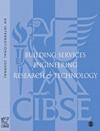A data-driven workflow to improve energy efficient operation of commercial buildings: A review with real-world examples
IF 1.8
4区 工程技术
Q3 CONSTRUCTION & BUILDING TECHNOLOGY
Building Services Engineering Research & Technology
Pub Date : 2022-03-14
DOI:10.1177/01436244211069655
引用次数: 4
Abstract
Data-driven building operation and maintenance research such as metadata inference, fault detection and diagnosis, occupant-centric controls (OCCs), and non-invasive load monitoring have emerged (NILM) as independent domains of study. However, there are strong dependencies between these domains; for example, quality of metadata affects the usability of fault detection and diagnostics techniques. Further, faults in controls hardware and programs limit the performance of OCCs. To this end, a literature review was conducted to identify the dependencies between these domains of research. Additionally, real-world examples using operational data from three institutional buildings in Ottawa, Canada, were provided and discussed to demonstrate these dependencies. Finally, a holistic tool-agnostic workflow was introduced which suggested the implementation of operational energy efficiency measures in the following order to ensure their full potential: (1) improve metadata, (2) address faults, (3) implement OCCs, and (4) monitor enhanced key performance indicators (KPIs). The proposed workflow is intended to be comprehensive, reproducible, nonintrusive, and inexpensive to implement. Practical applications: Optimization of building operations has been emerging among energy management professionals as a relatively low-cost means to achieve energy efficiency and minimize occupants’ discomfort. To this end, this study introduces a tool-agnostic data-driven workflow to building energy management practitioners that can assist them in achieving increased energy efficiency. The proposed workflow recognizes the interdependency of the various domains of research which have historically been treated independently.以数据驱动的工作流程改善商业楼宇的能源效率运作:以实际例子回顾
数据驱动的建筑运行和维护研究,如元数据推理、故障检测和诊断、以乘员为中心的控制(OCCs)和非侵入性负载监测(NILM)已经成为独立的研究领域。然而,这些领域之间存在很强的依赖性;例如,元数据的质量会影响故障检测和诊断技术的可用性。此外,控制硬件和程序中的故障限制了occ的性能。为此,进行了文献综述,以确定这些研究领域之间的依赖关系。此外,本文还提供并讨论了来自加拿大渥太华三座机构建筑的运营数据的实际示例,以展示这些依赖关系。最后,介绍了一个与工具无关的整体工作流程,建议按照以下顺序实施运营能效措施,以确保其充分发挥潜力:(1)改进元数据,(2)解决故障,(3)实施occ,(4)监控增强的关键绩效指标(kpi)。所建议的工作流是全面的、可重复的、非侵入性的,并且实现起来成本低廉。实际应用:建筑操作的优化已经在能源管理专业人士中兴起,作为一种相对低成本的手段来实现能源效率和最大限度地减少居住者的不适。为此,本研究向建筑能源管理从业者介绍了一种与工具无关的数据驱动工作流,可以帮助他们实现更高的能源效率。提出的工作流程认识到历史上被独立对待的各个研究领域的相互依赖性。
本文章由计算机程序翻译,如有差异,请以英文原文为准。
求助全文
约1分钟内获得全文
求助全文
来源期刊

Building Services Engineering Research & Technology
工程技术-结构与建筑技术
CiteScore
4.30
自引率
5.90%
发文量
38
审稿时长
>12 weeks
期刊介绍:
Building Services Engineering Research & Technology is one of the foremost, international peer reviewed journals that publishes the highest quality original research relevant to today’s Built Environment. Published in conjunction with CIBSE, this impressive journal reports on the latest research providing you with an invaluable guide to recent developments in the field.
 求助内容:
求助内容: 应助结果提醒方式:
应助结果提醒方式:


